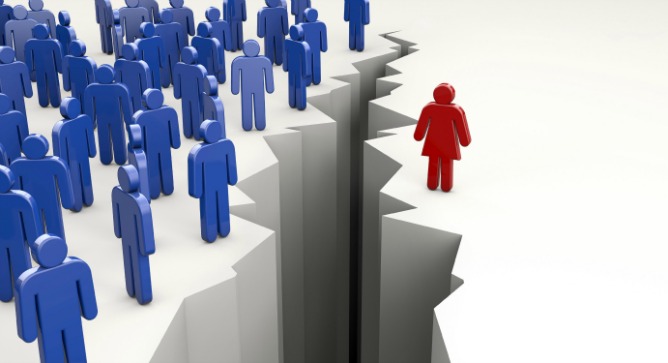Israel is light years ahead of its Middle East neighbors in the area of opportunities for women – in the workplace, in academia and in the military.
Yet gender equality is not a given in Israel. This is why the non-profit Israel Women’s Network (IWN) was established in 1984.
Spread the Word
• Email this article to friends or colleagues
• Share this article on Facebook or Twitter
• Write about and link to this article on your blog
• Local relevancy? Send this article to your local press
The first Israeli organization dedicated to promoting women’s rights and equality, IWN has successfully advocated for legislation such as the 1998 Sexual Harassment Prevention Law, and the 2005 law establishing a Commission for Equal Employment Opportunities.
The Ramat Gan-based organization also has brought precedent-setting lawsuits fighting discrimination in the workplace and the military. It has helped women who have been refused a religious divorce as well as female victims of sex trafficking. In 2006, IWN was granted consultative status in the United Nations Economic and Social Council.
Galit Desheh, executive director for the past 18 months, was just 14 years old when IWN began. While earning her doctorate in political science at the Hebrew University studying gender and nationalism in Northern Ireland, she volunteered at IWN and has been a feminist activist for many years.
“I worked at a sexual assault crisis center in Tel Aviv, and then managed IWN’s education department for five years, so this was a natural position for me,” she tells ISRAEL21c in a recent conversation about IWN’s latest accomplishments and programs.
Equal pay supported by Israel’s high court
The heart of IWN is its Advocacy Center.
“Our most prominent achievement is the Supreme Court ruling in March 2012 regarding equal pay,” says Desheh.
This case involved a female employee who sued her employer for wage gaps over 14 years. “We came into the process toward the end, and it’s amazing because the court ruled that the responsibility to make sure men and women get equal pay is on the workplace and not on the woman. If she’s asking for less than a man, the employer must assure she gets equal pay.”
Desheh notes that the ruling acknowledged that the complainant really did, as she claimed, receive 36 percent less than male employees in equivalent positions. “That’s about the average wage gap between men and women here and in the United States,” says Desheh.
One of her primary tasks is research.
“Every year, we publish a census in partnership with the Strauss corporation, counting the number of women in top management in the Tel Aviv 100,” she says. “And we just published a 500-page data book on the status of women in Israel between 2007 and 2012, covering every aspect of women’s life in Israel.”
This report will be sent to all members of the Knesset, whom Desheh credits with increasing sensitivity to the issues important to IWN.
“We found the state is putting much more money into projects that advance the status of women suffering from severe violence — such as a huge project to care for adult and children victims of sexual assault — and also a lot into taking care of trafficked women in prostitution. There is also a lot of legislation that has improved the status of women economically.”
On the other hand, she adds: “Many women over age 45 cannot find a job, and the number of battered women has not decreased. Feminist activity has increased attention to the issues, but we still have a long way to go.”
Shaping attitudes
IWN’s Nemesh program for Israeli adolescents, established in 2001, instills awareness of gender issues among both sexes. Nemesh group leaders help young women recognize their leadership potential and young men recognize that their individual desires, talents or dreams do not have to fit male stereotypes.
The goal is to head off the internal conflicts and frustrations that often get expressed through violence or depression.
Based on the success of this program in Jewish schools, in 2003 IWN created a Nemesh curriculum for students in the Arab sector. It employs women from within the communities to lead sessions geared for Arab culture, including discussions on early marriage, forced marriage, bigamy, and educational and professional opportunities for women.
“We’ve restructured the program and are piloting a new model to be more involved in the community,” says Desheh. “We will continue to work with the girls, and this year we plan to work with parents and education staff as well.”
Another Nemesh offshoot, Warm Homes, provides 10 career-building and economic-empowerment sessions in a state therapeutic day center for teenage girls in distress.
Mothers reentering the workforce
The organization’s new program for mothers of young children offers advice and support about reentering the workforce, juggling career and parenting, and asserting economic rights.
“This is a group that needs special attention,” says Desheh, the mother of daughters aged 12, eight and three. “We plan to run the groups in various cities.”
In cooperation with municipalities including Jaffa, Rishon LeZion, Herzliya and Holon, IWN also is sponsoring leadership and coexistence groups for girls and for mothers of young children, facilitated jointly by Jewish and Arab instructors.
Though IWN began as an advocacy group for women in the workforce, Desheh says, “After 30 years it’s also functioning as an umbrella for other organizations, and we sort of deal with everything.”
The organization’s free hotline is a source for legal counseling, support and intervention for women facing discrimination in the workplace or unsure about their rights during pregnancy or fertility treatments. The hotline is the one of the few activities funded by the government.
“Because we’re a policy-change organization, we try not to rely on the state,” says Desheh.
Funding comes from foundations, grants, private donors, membership dues and fees for lectures and workshops. IWN also offers professional organizational analysis for companies wanting to address issues of gender equality and sexual harassment in the workplace.
*Image via Shutterstock.com













